Interview with Investigative Filmmaker Jeremy Corbell
Investigative filmmaker Jeremy Corbell talks about his documentary, 'Moonwalker', which profiles NASA astronaut Dr. Edgar Mitchell and his fascination with the paranormal.
Jeremy Kenyon Lockyer Corbell makes his living seeking out the ExtraOrdinary; that seemingly gratuitous capitalization perfectly encapsulating his mission to–as he puts it–“force us to reconsider the fabric of our own beliefs” and consider an atypical alternative. His approach is to undermine attempts to discredit unorthodox opinions by way of discrediting the opinion holders themselves.
This investigative journalist and documentarian believes that the key to opening minds to a radical viewpoint is to filter the message through credible sources; highly regarded, successful, smart individuals whose very presence compels an audience to, at the least, hear them out.
Corbell demonstrates this method in his documentary, Moonwalker, which profiles the late Dr. Edgar Mitchell. In this iteration, the credibility lies in Mitchell’s credentials: NASA astronaut, aeronautical engineer, Lunar Module pilot of Apollo 14, and the sixth person to walk on the moon. Less credible were the theories he developed over the course of his career; Mitchell was outspoken in his conviction that aliens exist, that they have visited earth and that governments cover this fact up. He also believed in parapsychology and remote healing, which he claimed cured him of cancer.
Corbell was one of the last people to interview this enigmatic figure before he died at age 84 in February 2016. His documentary focuses on Mitchell’s involvement in Ufology and ExtraTerrestrial intelligence.
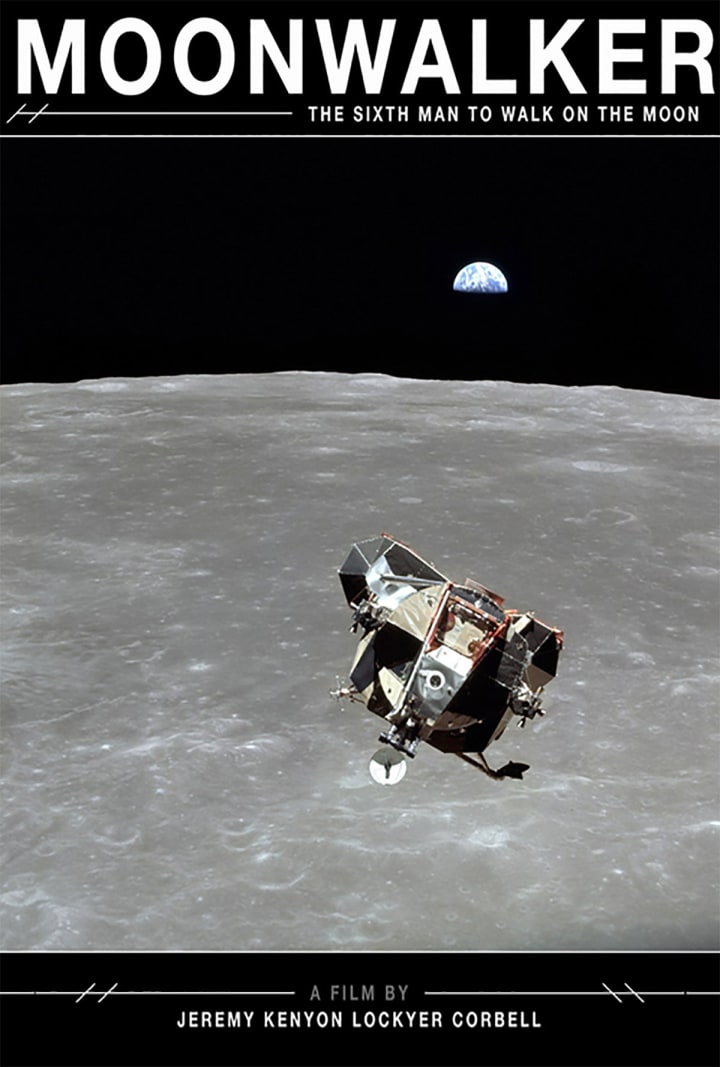
Image courtesy of Jeremy Corbell
OMNI: What first triggered your deep fascination with the UFO phenomenon?
Jeremy Corbell: It was 1989, and I was 13 years old. I remember sneaking a radio into bed so I could stay up late and surf the airwaves. I hid under my sheets and kept the volume low, as to not get caught staying up late on a school-night. I found a station broadcasting, to me at the time, a random interview. The questions were being asked by a Nevada-based reporter, George Knapp. He was interviewing and investigating the claims of a former government physicist named Bob Lazar. At that time, no one had heard of Lazar outside of scientific circles. Today, Lazar is famous–the only reason anyone knows of Area 51 is because of Bob. His story eventually became global news. OMNI actually did an extensive article on Lazar about five years after he came forward with his story (OMNI MAGAZINE, APRIL 1994).
What drew me into Lazar’s story was his description of how flying saucers actually worked. The story goes, Lazar was stationed at a top-secret sub-base of Area 51 in Nevada called S4 and was tasked by a branch of the United States government with reverse-engineering a Non-Terrestrial propulsion system. He later discussed a power-source he examined (an isotopically stabilized version of Element 115) and the Anti-Matter Reactor harvested from one of the saucers. He even went into great detail on how these machines (at least the one he personally worked on) traversed space-time. His story was mind-blowing. It tantalized the imagination and provided potential proof that we were being visited by non-human intelligences and our government had actually recovered, or been given, some form of alien technology.
The propulsion technology Lazar described was so counterintuitive, it literally flipped my script. He talked about wave guides and gravity wave amplifiers. He explained that Gravity was a wave and how, like any wave, it could be amplified. The concept of amplifying and directing gravitational waves had huge implications; if you distort gravity, you are also distorting time-space. All three (gravity / space / time) are intimately connected.
In essence, traditional propulsion is like shooting a bottle rocket into the sky – it’s pretty straightforward. What Lazar was describing was far more sophisticated. Imagine that time-space is like a waterbed, and on that waterbed you place a bowling ball. Anywhere you press your fist on the bed, the bowling ball will fall towards your fist. Essentially, this is what happens when you distort space-time with a powerful and directed gravity wave. You’re not really flying, rather, you’re falling towards your destination.
This was the moment, this one interview when I was 13 years old, something powerful ignited inside of me and I began my journey towards seeking the truth. A sort of bizarre quest to personally find answers to these big questions. I wanted to know if there were other intelligent and technologically advanced lifeforms. More importantly, I wanted to know if they were visiting Earth and, if so, what is the purpose of these visitations? After all, it takes only ONE of the millions of witness reports to be true for the whole egg to crack. Just one. And those are some good odds. On that evening with my radio, my curiosity was weaponized. There was no turning back. I wanted answers. And now, decades later, I’m satisfied I have found some of those answers.
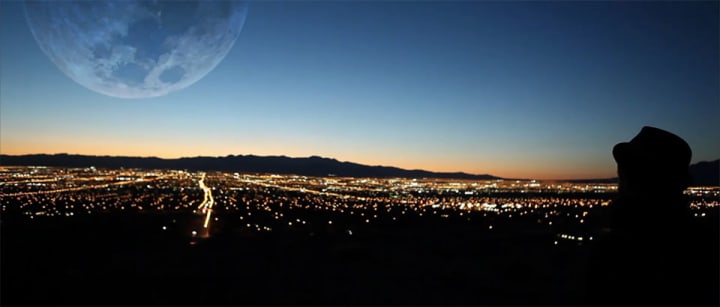
Image courtesy of Jeremy Corbell
How would you define science fiction? Is it related to science?
Many things we once considered to be Science Fiction have evolved into Science Fact. I think about that every time I get in an airplane or FaceTime my wife on my iPhone. Existing at this moment in human history is similar to a surrealist Salvador Dalí mashup of The Flintstones & The Jetsons.
On one hand, we are still in the Stone Age; we have a Fred Flintstone mentality, propelling vehicles with our bare feet and square stone wheels. For the most part, we don’t utilize our available technology for the good of the Earth and Humankind. We prioritize profit over need and caution over evolution. It takes individuals like Elon Musk (who has the vision and means) to embark on a personal crusade to alter the way we think and consume energy–it’s astounding! We seem to be behind the curve in many fundamental ways; it takes pioneers in each critical sector of human evolution to begin the revolution of how we relate to our world.
On the other hand, we’ve made some enormous technological leaps that at one time seemed like science fiction. In just the past five years alone we've made mind-boggling strides even George Jetson would be astonished by. We now know Gravity is a wave, functional nanotechnology on the atomic scale is a reality and atomic printing is the future of production. We’ve created (unstable) Element 115 in minute amounts using particle accelerators and sent particles of light into the past and retrieved them (like a rudimentary version of WonkaVision). We’ve achieved instantaneous binary communication through the pairing of quarks with implications so vast, breaking the speed of light is only a byproduct footnote. Additionally, current scientific analysis seems to suggest that we live in a holographic Multiverse. A world built from data, where any particular moment contains the entirety of all cause and effect reactions simultaneously and in infinite combinations both temporally and physically. Through the study of quantum mechanics, we understand physical reality directly responds to our personal consciousness; the Universe literally adapts its fundamental laws and manipulates matter in relation to our awareness. If this Science Fact doesn’t sound like Science Fiction, like Werner Herzog, I’ll eat my own shoe.
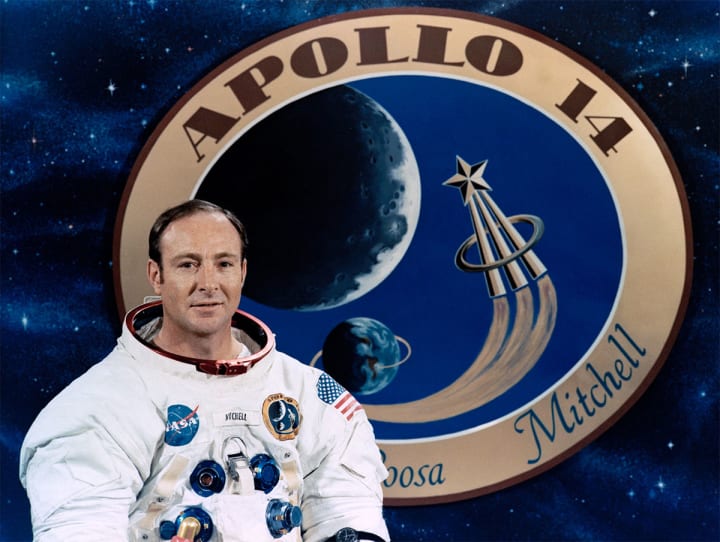
What was your initial impression of Edgar Mitchell’s controversial claims, and how did your opinion and belief evolve over the course of your interactions with him?
When I first met Dr. Mitchell, I was mainly interested in his experience of being the 6th man to walk on the Moon. He was a hero to me; he was a MOONWALKER for Christ sake! How cool is that? Only a handful of people can say they walked on another celestial body and looked back at the Earth’s globe. Dr. Mitchell’s other claims were almost auxiliary to my desire of speaking with him. Once we began filming, however, I found the rabbit hole to go quite deep.
Dr. Mitchell was a very precise man; he was clear, eloquent and direct. Initially, I desired to learn what he thought of Bob Lazar’s claims and to confirm some confidential information I had been given that only Dr. Mitchell could confirm. Once we got past those basic points, I was exposed to a deeper, more philosophic side Dr. Mitchell had to share. You have to understand, Dr. Mitchell didn’t tow the line in any area of his life; he was a sort of Space Cowboy. A pioneer among mortals. Dr. Mitchell had seen some shit and was willing to talk about it. A moment that particularly sticks out is when we discussed a seminal moment he had when in-route back to Earth during his Apollo 14 mission. He described it to be spiritual in nature and explained he had a cosmic experience upon his decent that forever changed his belief structure. He likened it to a game of pickup-sticks; he said everything he thought he knew about the Universe was thrown in the air and scattered about. Ever since, he’d been picking up those pieces and trying to make sense of it all. When he explained this experience to me, man to man, person to person, I couldn’t help but be affected.
Dr. Mitchell was a believer. He had personally witnessed what we call The Paranormal due to his work at S.R.I. (Stanford Research Institute). He was also briefed on the reality of UFOs by military and intelligence officers; people who were in the position to know. Dr. Mitchell, like me, simply didn’t have the luxury of disbelief by the time I met him. That is something both he and I agreed on adamantly.
How much creative input in your documentary Moonwalker did Dr. Mitchell demand, and how much did you ultimately afford him?
None. Dr. Mitchell trusted me. Because he knew some of the individuals I was working with and he watched a few of my films prior to us meeting, I believe he took a leap of faith that I wouldn’t distort his words. On the other hand, I pushed him on topics; I didn’t want to leave any stone unturned in our sessions together. It wasn’t always comfortable interviewing Dr. Mitchell and there were times when you could see his temper rise.
From the beginning, I made it clear to Dr. Mitchell I wanted to share my footage with the global public. He was all in, he wanted to talk. He deeply believed humanity had a “need to know” and a “right to know” about UFOs and what Dr. Mitchell called The Coverup. After all, he had seen firsthand how information was compartmentalized and hidden from the public, he wanted no part of it. He explained from a military standpoint, the UFO Phenomenon poses a significant threat. It’s a National Security problem, and has always been treated as such. He was adamant on the fact that our nations best kept secret is that we are being engaged by other advanced intelligences and he spoke about how the public has been kept in the dark for decades on the topic. He was very matter-of-fact about that. We discussed the two main reasons for the veil of secrecy. One, no Department Of Defense in the world is willing to admit to its citizens that craft of unknown origin are traversing our skies with impunity. Two, they are so advanced, both technologically and with their maneuverability, we have zero control or recourse. We postulated the reasons for The Coverup, the first being how the uncertainty caused by this reality could be panic invoking to the public. The second is simply that we want to have a technological advantage over other nations. With a technological advantage, we will remain a dominant military superpower.
Dr. Edgar Mitchell was intelligible, so it’s my job to present my film footage with the same clarity. With my work I aim to show who Dr. Mitchell was as an individual, as well as accurately depict the narrative he conveyed to me. That’s my mission, and I’m honored he gave me the opportunity to do so.
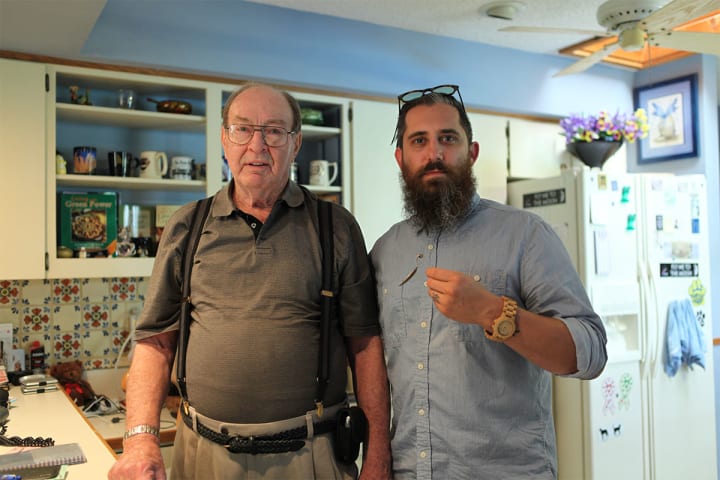
Dr. Edgar Mitchell and Jeremy Corbell
What is the most compelling evidence you have come across in support of the existence of extraterrestrial beings?
Some of the best evidence for the uneducated on this topic is the documentation of mass-sightings such as the Phoenix Lights event in 1997 and the Battle of Los Angeles incident in 1942, an event my Grandmother was eyewitness to. Also, the Ariel School Mass UFO Experience in 1994 where 62 children in South Africa had a bizarre and fascinating close encounter; This event was investigated and documented by the BBC and Dr. John E. Mack, a professor of psychiatry at Harvard Medical School.
There have been many mass-sightings over the past decades. It’s a great departure point for conversation because they are hard to deny, especially when you have both civilian and military witnesses coming forward telling the same story from completely different vantage points. Because you have eyewitness accounts from credible individuals and trained observes mixed with photographic and digital data (such as ground and air radar), it becomes difficult to dismiss the event as mass hallucination or trickery.
In fact, I’m working on a case right now that sits right in the sweet zone. I was provided insight and access to information of a recent military event that is not public at this time. It has all the points of interest that I like to focus on, things I can prove, and top notch corroborating witnesses with footage to back up the claims. It was a recent event, and has to do with scout-craft docking with USOs (Unidentified Submerged Objects). It’s a very important and complex case that I believe will be revelatory, once I make it public. That’s all I will say about it at this time.
Truthfully, however, the most compelling evidence I have encountered has been in private, speaking with concerned individuals within the Military Industrial Complex and intelligence communities who want the truth exposed. These conversations have provided me with my best evidence, and my most solid leads as a journalist.
What is the most popular counterargument to that evidence?
The most popular counterarguments to denying the UFO reality are pretty obsolete by this point in history. We are learning new things every day about the nature of reality and our place in the Universe. It’s hard to deny that life is homogeneous throughout the cosmos, from both a philosophic and scientific standpoint; Scientifically, it’s beyond improbable. From the Drake Equation to the Fermi Paradox, people will always debate the possibility of visitation, but if they’re genuinely curious to know the truth, they should spend a little more time looking skyward.
The idea that other Earth-like planets in the goldilocks zone have been nourishing life far longer than here on Earth seems to be easy to grasp for most. I believe the concept of space-time travel is what's most difficult for the majority to comprehend - this is what first attracted me to Bob Lazar’s explanation of how craft are making interstellar trips. The public tends to speak blindly about the UFO topic and in part, that’s by design. We have been taught to ridicule and mock the concept of all things extraterrestrial, embedded quite intentionally into our culture. The truth is stranger than fiction, and it’s quite easy to begin to get a grasp on it if one simply takes the time.
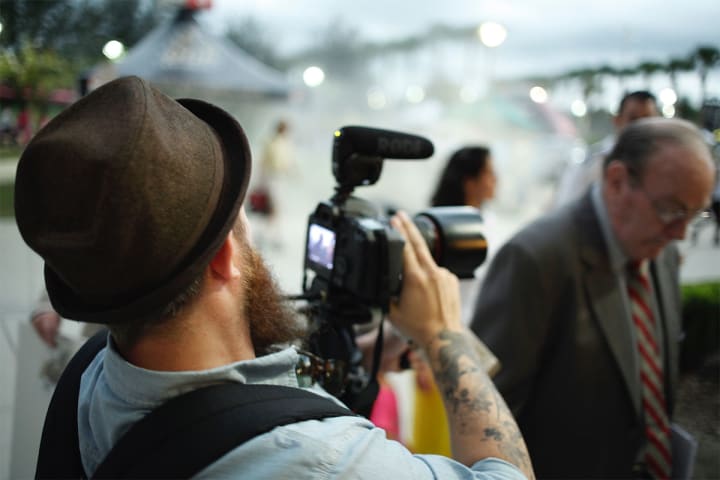
Image courtesy of Jeremy Corbell
What is the central message of your oft-cited call to “weaponize your curiosity”?
My message is transparent. Ideas are weapons. Your thoughts are extraordinarily powerful. Your questions can act as ammunition to obliterate obstacles standing in the way of knowledge. It’s fucking simple.
If extraterrestrial life does indeed exist, what would need to happen for government bodies and the general public to accept it?
I don’t have a clue. Proof to one person is not proof to another. I feel if any one person sincerely looks at the mountain of documentation that is available on the subject, it’s an undeniable conclusion we are not alone. We have been and are being visited, taunted or educated by some sort of non-human intelligence. And that’s just the starting point. It’s a matter of personal prejudice to hold the belief that humans are the pinnacle of intelligence and technological advancement in our ever-expanding Multiverse. It’s an ego-driven conclusion or a fear-based assumption that goes against basic logic and common sense. I have personally been satisfied beyond a shadow of a doubt that The Phenomenon is real. Our conversation needs to be elevated to the next level.
However, ultimately the architects of the secrecy are the visitors themselves. If they wanted to reveal themselves, they would reveal themselves. It’s quite possible the truth of the matter is so damn strange, we can’t even see it.
Which piece of science fiction features the most accurate representation of aliens?
Science fiction would have to be Star Trek. In fact, I did an interview with Eugene Roddenberry about UFOs and the future of humanity. It has yet to be released, but it’s fascinating. His father was a genius, and Eugene is a chip off the old block.
However, if you want an accurate representation of aliens, how about a film funded completely by the CIA on the subject of UFOs and ET contact titled UFOs: Past, Present, and Future? (narrated by Rod Serling) released in 1974. This little known piece of cinematic history was an attempt from inside the intelligence community to make up for the Project Blue Book debacle. It was presented to test the climate of thought on the topic of UFOs with the public. The film describes an actual landing of craft with beings entering Holloman Air Force Base in 1964. By the way, there is actual footage of this landing - so I would say that it’s a pretty accurate film.
I had the opportunity to question Dr. David Robarge (Chief Historian for the CIA) and and Eugene Poteat (Senior CIA Scientific Intelligence Officer, responsible for programs at Area 51) about the film. My mentor in journalism, George Knapp, was hosting a panel at the Atomic Testing Museum in Las Vegas. A few decorated CIA men were assembled to talk about the great achievements that were made at Area 51, such as the Stealth Fighter, The SR-71 Blackbird, etc. I asked Dr. Robarge if he was aware the CIA funded UFOs: Past, Present, and Future?. He denied having knowledge that the funding was generated by his agency. However, the film WAS backed by the CIA, and it’s awesome. You should watch it. You can see me interviewing the CIA chaps here.
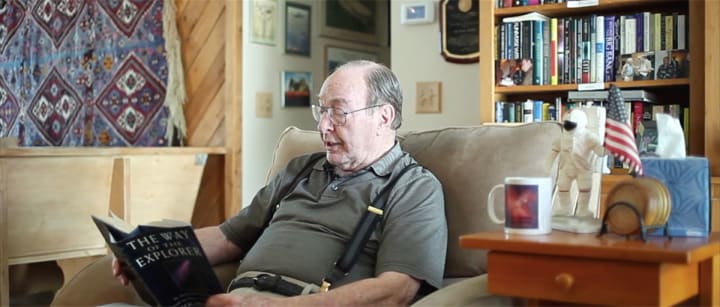
Image courtesy of Jeremy Corbell
Are we as a society moving toward being comfortable discussing this? (Especially with the continuing trend of big-budget sci-fi films to this nature.)
Yes. Clearly we are. In 2013 my company and business partner, Reuben Langdon, produced an event called 'The Citizen Hearing on Disclosure'. Reuben is really the unsung hero in getting that event to happen, and Dr. Mitchell was actually our opening speaker at the hearing. It consisted of forty researchers along with military/ agency/ political persons of high-rank and station coming together at the National Press Club in Washington, DC to testify to six former members of the United States Congress about events and evidence indicating an extraterrestrial presence engaging the human race.
It was a historic event. We made the footage available (in multiple languages) to allow these brave testimonies to become part of the public record on the topic of UFOs. If that doesn’t open the doors to conversation, nothing will. You can watch all of the testimony here.
The WikiLeaks release occurred while your film was still in production. How did you capitalize on that last-minute development to facilitate your film’s positive reception?
I’m doing an interview with OMNI.
How does the WikiLeaks play into the overall narrative that you conveyed in your film?
We will have to wait and see. I’m still editing my footage, and the Wikileaks situation was both good and bad for the UFO topic. It was no secret that John Podesta and the Clintons have been trying to open the books on the UFO reality for quite some time. Podesta has petitioned at the National Press Club for the cause and both Hillary and Bill Clinton have openly talked about their interest and intent regarding UFOs and exposing the truth to the American people. As it stands, I’m not going to hold my breath that the WikiLeaks will be a Hail Mary towards Disclosure. Unfortunately, there are forces far beyond political powers controlling the information. It’s up to curious-minded individuals to educate themselves personally.
How has your exploration into the paranormal influenced your appraisal of science fiction from both an enjoyment perspective and in terms of its utility for scientific research?
Two investigations stick out in my mind; first is Skinwalker Ranch. George Knapp and Colm Keller wrote a fascinating book about the bizarre and profound paranormal activity on a seemingly otherworldly ranch in Utah. The ranch sits on sacred Native American land and has a long history of being an epicenter for UFO and paranormal activity. George was the only reporter ever allowed on the ranch to cover the story; Colm is a revered scientist employed by Bigelow Aerospace (owned by billionaire Bob Bigelow). There will be more coming out about Skinwalker Ranch in 2017.
The next investigation that really pushed the envelope of my consciousness is about a guy I call Nano Man. He’s a military-funded nanophysicist that peruses cutting-edge nanotechnology with the sole purpose of helping humans become Extraterrestrials. I have filmed and produced two episodes in the series so far. The first is about a mysterious meta-material he believes “was not created here on Earth.” I took it to NASA's Ames Research Center to see what was up with this alleged Off-World (alien) nano-robotics that Nano Man described as 'Utility Fog' (a term from Science Fiction). In the second episode, I turned my lens on an advanced propulsion system he calls The SpaceDrive. He believes this strange propulsion system may provide hard, physical proof for the existence of the Multiverse (a four-dimensional or higher reality). The discovery would revolutionize not only our understanding of the known Universe and the physics that govern it, but would also exponentially expand the possibility of humanity becoming an interstellar spacefaring civilization.
So basically … I’m already living in a sci-fi movie. I don’t know what else to say. You can watch my Nano Man series here.
Consider the portrayal of UFO and ETI in conventional science fiction as opposed to what your research points out. What are the key differences in these proposed realities?
You gotta love the movie E.T., but what we are dealing with is far more complex and, unfortunately, it may be far more sinister. Most films on the subject are based on actual encounters and some films have actually done a great job at expressing the complexity of the UFO problem. In fact, there has been a great deal of guidance given to those in Hollywood who portray ETIs and UFOs in cinema. I know many military men who were tasked, from time to time, to “advise” for films on behalf of our military and intelligence industry. The Abyss, Close Encounters, Fire In The Sky, Contact, even the television show Stranger Things, were all born from a confirmed event or they referenced actual events.
The one aspect of the UFO problem that I have not seen properly transferred to film yet, is the concept that UFOs are only a symptom of a much greater reality. That concept is so deeply transformative when realized, it’s hard to imagine capturing the feeling with cinema.
You published a video clip called "Bending Spoons" in which Edgar Mitchell tries–and fails–to teach you to use psychokinesis. What was your experience like doing that? Have you tried again?
No. In the film clip you see Dr. Mitchell attempting to teach me to bend spoons with my mind. Apparently, I’m the worst psychokinetic spoon-bender on the planet. I’m OK with that. The backstory is in his work at S.R.I. (Stanford Research Institute) circa early 1970s. He was telling me about what they learned from the experiments they pursued there and about some CIA-funded work being done at that laboratory that he was a part of. Dr. Mitchell personally experienced a multitude of manifestations of The Phenomenon at that time. For example, as they would scrutinize Uri Geller and interrogate his methods, shit just got weirder and weirder apparently. Dr. Mitchell said it got to a point where objects were materializing and de-materializing in the lab. At one point, a miniature flying saucer materialized and was floating around the room. During this era, Dr. Mitchell started to ask questions about if our consciousness somehow influenced the manifestations of The Phenomenon. He went on to create the Institute of Noetic Sciences in 1973 in pursuit of questions like this.
In the end, because I failed so powerfully at melting metal with my mind, Dr. Mitchell told me to “Keep my day job” and signed a hilarious letter to bring back to my wife as a trophy of my failure. He had a great sense of humor.
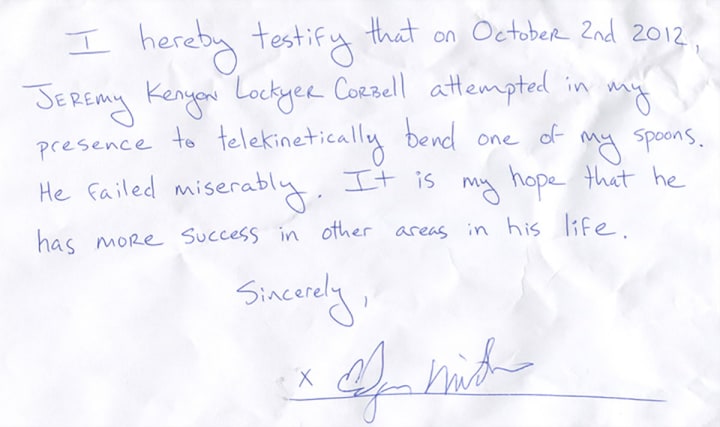
Image courtesy of Jeremy Corbell
How would you describe Dr. Mitchell’s attitude toward his position of black sheep among his NASA peers. Did he celebrate his deviation from the norm, or did he harbor resentment or frustration at his naysayers?
Dr. Mitchell was a confident man and I don’t think he gave a shit what anyone thought. He was pissed at NASA on some level, pissed at those who fought to keep the UFO reality a secret. He also had his secrets. He kept some Moon rocks hidden in his home safe (right next to his psychokinetically-bent spoons). No, I don’t think he gave much of a shit what people thought of him.
How do you believe he should be remembered? (Or even, how did he want to be remembered?)
Dr. Mitchell was an explorer. A pioneer. But above all else he was a humanitarian and a seeker of truth. There have been many great men and women who were courageous enough to tell the truth about UFOs, and I’m confident there will be many more in the future. However, sadly, no one can replace Dr. Edgar Mitchell - 6th man to walk on the Moon. The man wore space-boots for Christ sake… those are huge shoes to fill. I can say this with absolute certainty, Dr. Mitchell’s curiosity was weaponized on his decent back to Earth from his Apollo 14 mission. It was the moment that forever changed his life. I can only hope others make the same leap, take risks and make meaningful moves in their lives.
You had the unique opportunity to be the last person to interview Edgar Mitchell. What were his last words to you?
Honestly, I think they were “God Dammit!” I woke him up from a nap to get a final release signature before having to jump on a plane back to Los Angeles from Miami. I don’t think he liked being woken up. It’s funny though, it’s not his last words that are important, it’s the way he opened his home and heart to me. That, I will always remember. And his dog Cutie. He loved that dog (who is featured in my film). Cutie got more treats than there are stars in the heavens above.
How has your research influenced your personal belief system and values?
It has transformed them entirely. It has completely altered my worldview. I went out to find the truth and ended up finding so much more. I went from understanding the UFO problem as a nuts and bolts issue, to seeing the issue as a much larger paradox. I realized the UFO Phenomenon is only one manifestation of a much larger reality. It’s hard to describe in words and that’s why I make films about it. I tell the whole story in a lecture you can watch here.
What does it take to be a black sheep? Can we all aspire to take on a ‘black sheep’ persona? Should we?
It takes courage. And the answer is yes. Break from the fold. Shake things up. Stir the pot. Bend the rules. And if you’ve got anything to confess, come to me about it. Part of being an investigative filmmaker is spilling secrets, the other is knowing when to hold them. I’m good at doing both.
What would you like your viewers to take away from the film?
That depends on what you’re seeking to find. We see what we’re looking at, and we hear what we are listening for. If my audience gets a glimpse into who Dr. Mitchell was and what he was passionate about, that’s enough for me.
Learn more about Corbell’s films by going to ExtraordinaryBeliefs.com
About the Creator
Rachel G. David
Head of Business Development @ Creatd (Nasdaq: CRTD)




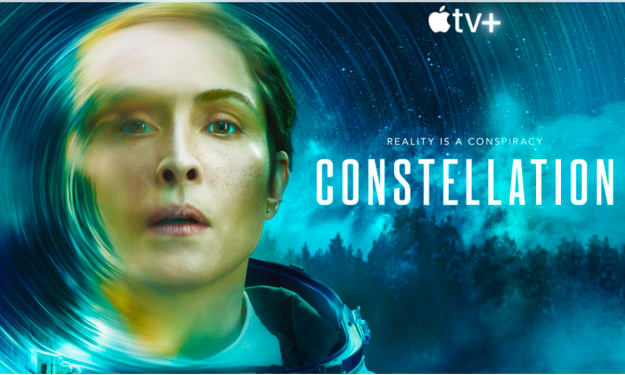

Comments
There are no comments for this story
Be the first to respond and start the conversation.